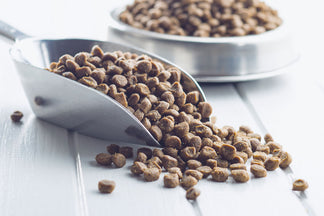We continue our A to Z series with the letter “S”. Today's ingredient is Selenium.
What is Selenium?
Selenium is a trace mineral that our bodies use to produce glutathione peroxidase, an enzyme that serves as a natural antioxidant.
Common names for Selenium
The most common name variations include high-selenium yeast, selenized yeast, chelated selenium. Synthetic selenium, which is inferior to natural selenium, is called sodium selenate or sodium selenite.
Why is Selenium included in pet food?
Selenium is added to pet food because of its antioxidant properties and its crucial role in supporting normal pancreatic, fat absorption, and thyroid function.
Common benefits or risks of Selenium
Benefits: Selenium helps to improve joint skin and coat health.
Research suggests that increased intake of Selenium is tied to a reduced risk of cancer. The watershed study on Selenium and cancer in people was a doubleblind intervention trial at the University of Arizona Cancer Center 1/.
Animal studies suggest similar benefits. Nearly 200 animal studies have been conducted to evaluate the effects of selenium levels on cancer. Of these studies, two-thirds have found that high levels of Selenium reduced the development of tumors at least moderately (by 15 to 35% compared to controls) and in most cases very significantly (more than 35%). Only in a very few cases was Selenium found not to be effective 2/.
Risks: In Humans, very high Selenium doses are known to cause Selenium toxicity, which presents with depression, nervousness, emotional instability, nausea, vomiting, and in some instances, loss of hair and nails. Like most things, you can get too much of a good thing.
Miscellaneous facts about Selenium
- Look for natural Selenium, not synthetic versions like sodium selenite or sodium selenate, which are less effective and might even be harmful to the body. This holds true for most vitamins and minerals: natural versions are far superior and effective than synthetic versions.
- Dietary Selenium comes primarily from nuts (especially Brazil nuts), cereals, meat, mushrooms, fish, and eggs.
Sources and further reading
1/ Clark LC, Combs GF Jr, Turnbull BW, et al. Effects of selenium supplementation for cancer prevention in patients with carcinoma of the skin. A randomized controlled trial. Nutritional Prevention of Cancer Study Group. JAMA. 1996;276:1957-1963.
2/ http://lpi.oregonstate.edu/f-w97/selenium.html
http://totalhealthmagazine.com/features/pet-health/selenium-for-pet-health.html



 Food
Food
 Food
Food
 Food
Food
